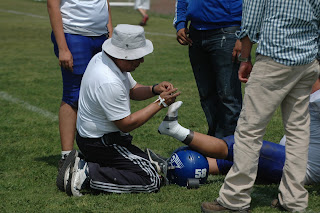These injury prevention ideas will prepare you and your loved ones to play securely. See here for more information.
1. Always wear a properly fitted helmet and change it after a serious fall
2. Have a good time, but understand your restrictions
Little ones should never ever play in or near water or bike on rough terrain without close guidance. And remember, everyone-- kids and grownups-- needs a life jacket when on the water.
3. Recognize with your environments and stay alert
- Make sure to scope out the surface prior to you begin climbing, hiking, or mountain cycling.
- When boating on a lake, ocean, or river , make sure you understand where you will put in and where you will be getting. And if white-water canoeing or kayaking, make sure you understand and are gotten ready for the level of rapids and other water conditions.
- When swimming, never dive into the shallow end of a pool. This applies to natural bodies of water, too, like quarries, lakes, and rivers. When you do not know the depth of a body of water, pass the "Feet initially, first time" guideline to prevent brain, spinal cord, or other injuries. Find out more.
- Check the weather condition prior to heading out. And if you're swimming, get out of the pool or lake the minute you hear thunder or see lightening and seek shelter.
- Aim to prevent crowded areas-- on land or water-- as you could likewise be injured when somebody else does something careless.
- Stay alert and never use headsets; you need to hear exactly what's going on around you.
- If you or somebody you are with does take a tough spill, make certain you acknowledge the indication of a traumatic brain injury. Call 911 or seek emergency medical assistance as quickly as possible if the specific loses consciousness or feels baffled or disoriented.
- If you have a concussion, give yourself an opportunity to heal. Experiencing a second injury prior to the very first one heals could have long-lasting repercussions.
Signs of Concussion: Adults
The symptoms and signs of a traumatic brain injury can be subtle. Symptoms of a TBI might not appear up until weeks or days following the injury or may even be missed as people may look great although they might act or feel differently. The following are some typical signs and symptoms of a TBI:
- Headaches or neck pain that do not disappear;.
- Trouble remembering, concentrating, or making decisions;.
- Sluggishness in thinking, speaking, acting, or reading;.
- Getting lost or quickly puzzled;.
- Feeling tired all of the time, having no energy or inspiration;.
- Mood modifications (sensation mad or sad for no factor);.
- Modifications in sleep patterns (resting a lot more or having a hard time resting);.
- Light-headedness, lightheadedness, or vertigo;.
- Advise to throw up (nausea);.
- Enhanced sensitivity to lights, sounds, or diversions;.
- Blurred vision or eyes that tire quickly;.
- Loss of sense of odor or taste; and.
- Ringing in the ears.
Signs of Concussion: Children
Children with a brain injury can have the exact same symptoms as grownups, but it is typically harder for them to let others understand how they feel. Call your kid's physician if they have had a blow to the head and you see any of these signs:
- Exhaustion or apathy;.
- Irritation or crankiness (will not stop weeping or can not be consoled);.
- Changes in eating (will not eat or nurse);.
- Changes in sleep patterns;.
- Modifications in the method the child plays;.
- Modifications in efficiency at school;.
- Lack of interest in preferred toys or activities;.
- Loss of brand-new abilities, such as toilet training;.
- Loss of balance or unsteady walking; or.
- Vomiting.





